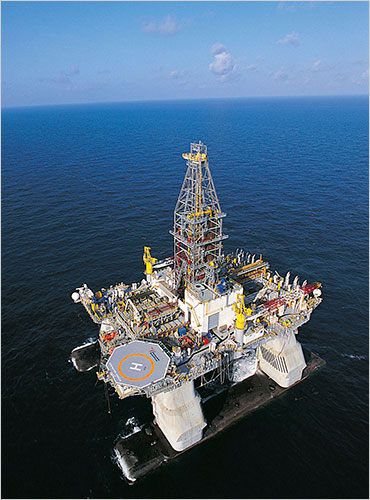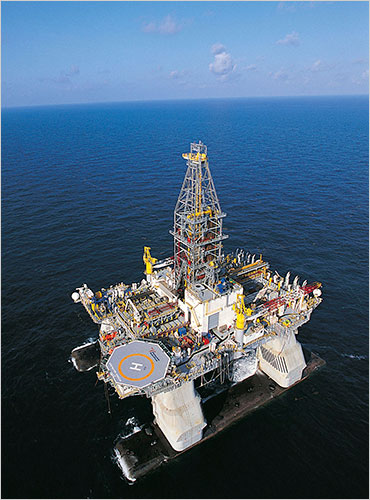 The Deepwater Horizon rig, pre-explosion and pre-tipping.Photo: TransoceanReuters is reporting that the 11 workers missing after an explosion on a Gulf Coast oil rig have been found safe.
The Deepwater Horizon rig, pre-explosion and pre-tipping.Photo: TransoceanReuters is reporting that the 11 workers missing after an explosion on a Gulf Coast oil rig have been found safe.
Update: 11 workers are still missing and 17 are injured after a large explosion on an oil rig in the Gulf of Mexico, according to the AP, Christian Science Monitor, Los Angeles Times, and others. Yesterday’s Reuters report appears to be wrong.
An explosion on a drilling rig 50 miles off the Louisiana coast late Tuesday night forced the evacuation of more than 100 workers and left the whereabouts of 11 in question. Seven others were critically injured and taken to hospitals, the New York Times reports. (Also changed.)
Coast Guard workers are searching the ocean for the 11.
The 396-by-256-foot rig is “leaning badly” and in danger of tipping over, according to a local parish official. That can’t be good for a marine ecosystem, even one accustomed to drilling, spills, and all manner of heavy industry.
This comes within weeks of:
- The awful coal-mine explosion that killed 29 men under the criminal safety record of Massey Energy CEO Don Blankenship.
- The crash of a coal freighter into the fragile Great Barrier Reef as it tried to take a shortcut from Australian mines to Chinese furnaces.
- The Tesoro oil refinery explosion that killed five workers in Washington state.
- The spillage of 18,000 gallons of crude oil from a Chevron into a canal in the Delta National Wildlife Refuge, also in Louisiana.
All in all, it’s been a pretty terrible month for fossil-fuel industry workers, defenders of the energy status quo, and organisms unlucky enough to live near coal, oil, or their shipping routes.
This isn’t to say accidents can’t happen within the clean-energy industry — installing offshore wind farms must have its own risks, though they lack the combustible materials of a drilling rig. The point is that these human welfare costs should absolutely inform our national energy project. All the more reason to move to safer sources.



